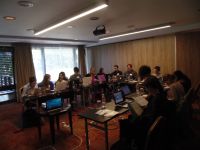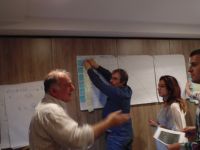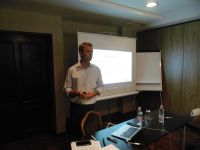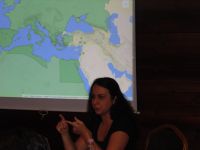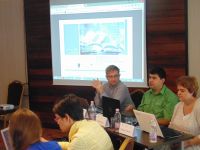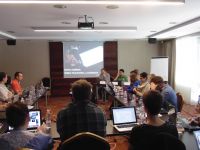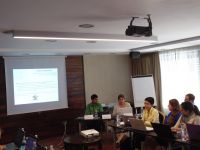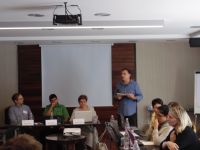Between 7th and 12th September, the Summer School in Digital Humanities and IT took place in Borovets, Bulgaria. It was organized in the framework of the Technological Ecosystems in the Humanities Research Programme of the Centre of Excellence in the Humanities to the St. Kliment Ohridski University of Sofia. This is the fourth of a series of events on the same topic that have been organized by the Digital Humanities research team at the CEH to the University since 2013.
More than 40 people were selected for participation in the two sections, among which graduate and doctoral students, young and advanced scholars from different academic institutions in over 10 countries.
The event was preceded by a public lecture at University of Sofia of the trainers in the IT section, Prof. Eduardo Miranda and Dr. Matthew Bass from the Carnegie Mellon University of Pittsburgh, USA. Prof. Miranda presented the new and popular process of software development currently gaining popularity under the name of 'design thinking'. Dr. Bass reviewed today's distributed software systems. Both lecturers attracted a significant audience of academic researchers and software developers and their presentations provoked the interest not only of research specialists in the field of IT but also of the business.
During the 6-day training in Borovets, the main topics in the DH section were: EpiDoc TEI XML for epigraphic monuments, using authority lists and vocabularies, XLST transformation scenarios and web publishing; geo-annotation, linked spatial data and geospatial tagging (Pelagios/Recogito/Peripleo); Python for data extraction and text processing, automatic description and cataloguing. The trainers were Gabriel Bodard, Valeria Vitale and Simona Stoyanova, researchers at the Institute of Classical Studies to the UCL, UK, as well as long-term partners in the DH initiatives of University of Sofia research group.
The main topics of the 3-day work of the IT training section lead by Eduardo Miranda and Matthew Bass together with Assoc. Prof. Dimitar Birov from the Faculty of Mathematics and Informatics to the University of Sofia were Аgile project management with simulation of real cases and interactive group work; Data intensive scalable systems; Service Software Architectures: Microservices. Both lecturers and participants in the School expressed their satisfaction of the training process and the new methods and approaches taught. Further events and collaborations are planned in the framework of the growing regional and international network of people working in the fields of Technological Systems and Digital Humanities.
The Summer School was closed on 11th September by a Round Table concerning the perspectives in front of Digital Humanities in Bulgaria and South-Eastern Europe. Dr. Dimitar Iliev from the Department of Classics and the DH Research Group to the University of Sofia presented the ongoing projects of the group, their stages, their achievements and the scholars involved in them. Toma Tasovac, the director of the Belgrade Centre for Digital Humanities and a representative of Serbia in DARIAH-EU, presented the possibilities for the DH researchers provided by this platfomr and all of its tools, network and initiatives. He emphasized the role of Digital Humanities in creating research infrastructures that can give access to knowledge to scholars and general public alike. He also briefly reviewed the crucial questions in the discussion about the contemporary development of humanities and social sciences in relation to Digital Humanities as well as in general.
Dr. Mariana Damova from the Mozaika Technological Labs presented a project of the aided by the Culture Programme of Sofia Municipality on "Sofia's Spirituality in Historical Context". It aims at the creation of an interactive map with places connected with the production and dissemination of manuscript versions of an important early modern Bulgarian work, the "Slavic-Bulgarian History" by St. Paisios of Hilendar. The map contains annotations, linked data and interactive elements that can be used for educational purposes on secondary-school level.
The discussion after the presentations came to the conclusions that more events of this kind should be organized in the future with even more focus on collaborative work, on the interaction between DH and IT specialists, on presentations of the work, the research projects and interests of the participants. Participants and trainers expressed their opinion that the training modules were highly effective and ways should be sought to continue the tradition of such educational events in the years to come.
Programme of the event - here.


